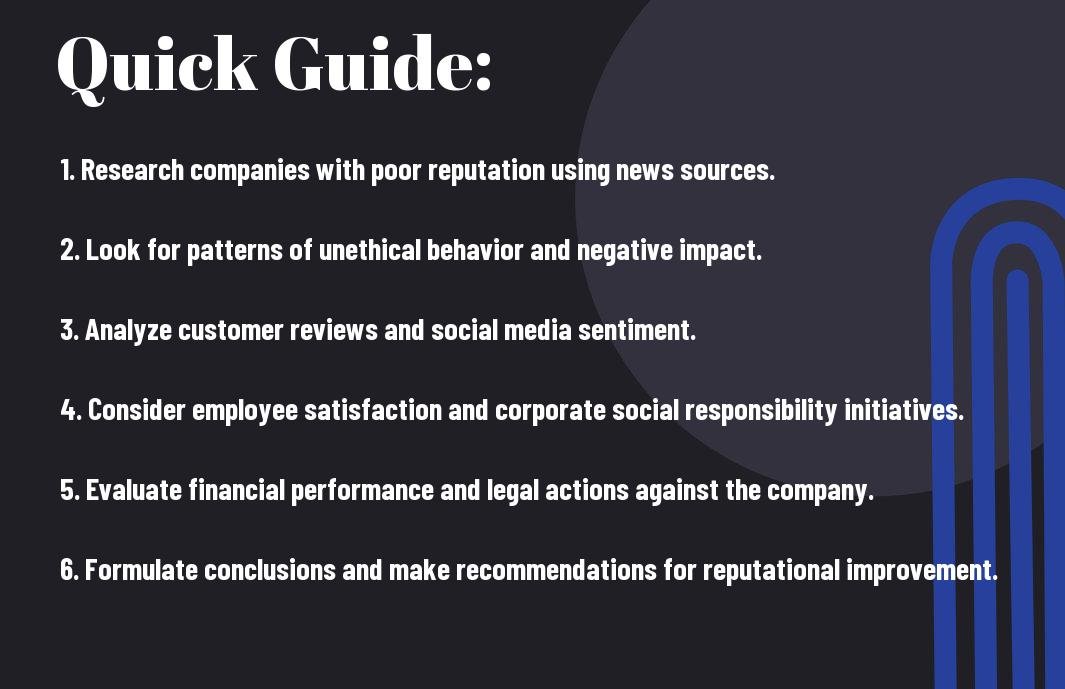Companies with the Worst Reputation – Examining Corporate Public Image
- Home
- Companies with the Worst Reputation – Examining Corporate Public Image

Companies with the Worst Reputation – Examining Corporate Public Image
Greetings, readers! Today, I thought I would delve into the volatile world of corporate public image and highlight some companies that have unfortunately earned themselves notoriously bad reputations. It’s important to examine these cases as they serve as cautionary tales of what can happen when a company fails to prioritize certain crucial aspects of their operations. By learning from these examples, we can better understand the impact that a negative corporate image can have on a company’s overall success. So, without further ado, let’s explore some of the companies that have struggled to maintain a positive public perception.
Key Takeaways:
- Transparency is Key: Companies with the worst reputation often lack transparency in their communication with stakeholders, leading to mistrust and negative perception.
- Accountability Matters: Failing to take responsibility for corporate actions can significantly damage a company’s public image, leading to long-term reputational harm.
- Effect of Ethical Misconduct: Engaging in unethical behavior, such as bribery or fraud, can lead to severe repercussions for a company’s reputation and bottom line.
- Impact of Environmental and Social Responsibility: Companies that neglect environmental sustainability or social responsibility may face backlash from consumers and stakeholders, impacting their public image.
- The Power of Crisis Management: A company’s reputation can be salvaged through effective crisis management strategies, demonstrating corporate integrity and swift action to rectify issues.
Types of Companies with the Worst Reputation
Before I delve into specific examples, it’s important to understand the types of companies that typically have the worst reputation in the public eye. These are the companies that have consistently failed in various aspects of their corporate responsibility, resulting in significant damage to their public image. When examining these companies, it’s vital to recognize the various ways in which they have failed, in order to better understand the impact of their actions on consumers, stakeholders, and the environment.
| Corporate Scandals | Environmental Abusers |
| Financial Fraud | Waste and Pollution |
| Unethical Business Practices | Irresponsible Resource Consumption |
| Product Safety Issues | Harmful Chemical Use |
| Corruption | Habitat Destruction |
Corporate Scandals
Corporate scandals involving financial fraud, unethical business practices, product safety issues, and corruption have been rampant in recent years. These scandals not only damage the reputation of the companies involved but also erode consumer confidence and trust.
Environmental Abusers
Companies known for being environmental abusers engage in waste and pollution, irresponsible resource consumption, harmful chemical use, and habitat destruction. These actions not only harm the environment but also affect the health and safety of communities living nearby.
Tips for Improving Corporate Public Image
Obviously, as a company looking to enhance its corporate public image, there are several strategies you can implement to improve your reputation. Here are some key tips to help you enhance your corporate image:
- Transparency and Accountability: Implementing transparency and accountability in your business operations can go a long way in improving your public image. Being open and honest about your practices and policies can build trust with your customers and stakeholders. This involves being upfront about any mistakes or shortcomings and taking responsibility for them.
- Strengthening Corporate Social Responsibility (CSR) Initiatives: Demonstrating a commitment to social and environmental responsibility can significantly enhance your corporate public image. By supporting causes and initiatives that align with your values, you can showcase your company’s positive impact on society and the environment.
After implementing these strategies, you are likely to see a positive shift in the way your company is perceived.
Transparency and Accountability
Transparency and accountability are critical components of building and maintaining a strong corporate public image. When business practices are shrouded in secrecy, it can lead to distrust among customers and stakeholders. By being transparent about your business operations and holding yourself accountable for your actions, you can foster trust and credibility. This may involve openly addressing any controversies or issues that arise and taking proactive steps to rectify them.
Strengthening Corporate Social Responsibility Initiatives
Investing in and strengthening corporate social responsibility initiatives can significantly enhance your company’s public image. By engaging in activities that benefit society and the environment, you demonstrate a commitment to making a positive impact beyond profit margins. This could include initiatives such as charitable giving, volunteer programs, and sustainable practices that align with your company’s values and resonate with your audience.
Step-by-Step Guide to Rebuilding Corporate Public Image
Not all hope is lost when it comes to rebuilding your corporate public image. With the right strategy and implementation, it is possible to overcome a negative reputation. Here, I will outline a step-by-step guide to help you rebuild your corporate public image.
Conducting a Reputation Audit
Before you can begin rebuilding your corporate public image, it’s important to conduct a thorough reputation audit. This involves analyzing the current state of your company’s reputation, identifying the root causes of any negative perceptions, and understanding how these perceptions are impacting your stakeholders. This process will involve gathering feedback from customers, employees, and other stakeholders, as well as conducting research on public sentiment towards your company. By understanding the current state of your reputation, you can develop a targeted strategy for improvement.
Creating a Comprehensive Communication Plan
Once you have a clear understanding of your company’s reputation, it’s time to create a comprehensive communication plan. This plan should outline how you will address the negative perceptions of your company and communicate your commitment to improvement. This may involve public statements, press releases, social media outreach, and other forms of communication. It’s essential to be transparent and authentic in your communications, and to demonstrate a genuine desire to make meaningful changes. By effectively communicating your commitment to improvement, you can begin to rebuild trust and credibility with your stakeholders.
Factors Impacting Corporate Public Image
Keep in mind that several factors can impact a company’s public image, shaping both its reputation and how it is perceived by the general public. These factors play a crucial role in determining the way a company is viewed and can have a significant impact on its success and growth in the long run. Knowing and understanding these factors is essential for companies looking to maintain a positive public image and credibility in the eyes of their consumers and stakeholders. Here are some of the key factors that can impact corporate public image:
- Media Coverage
- Consumer Perception
- Corporate Social Responsibility
- Employee Satisfaction and Treatment
- Product and Service Quality
Media Influence
Media coverage plays a crucial role in shaping a company’s public image. Negative press, scandals, and controversies can significantly damage a company’s reputation, leading to a loss of consumer trust and confidence. On the other hand, positive media coverage can help build a strong and positive public image, influencing consumer perception and brand reputation.
Consumer Perception
Consumer perception is another key factor that impacts corporate public image. The way consumers view a company, its products, and its practices can have a direct influence on its reputation. Negative consumer perception, whether due to poor customer experiences, unethical business practices, or subpar product quality, can tarnish a company’s public image and lead to a loss of trust and loyalty.
Pros and Cons of Enhancing Corporate Public Image
After examining the public image of various companies, it’s evident that there are both positives and negatives associated with enhancing corporate public image. It’s crucial to understand the potential benefits and drawbacks of shaping and managing a company’s public reputation. By doing so, businesses can make informed decisions about their branding and public relations efforts.
| Pros | Cons |
| Enhanced consumer trust | Potential backlash from stakeholders |
| Greater customer loyalty | Increased scrutiny and accountability |
| Improved employee morale | Risk of public relations missteps |
| Attracting top talent | Resource-intensive |
| Competitive advantage | Overemphasis on image over substance |
Increased Consumer Trust
Enhancing a corporate public image can lead to increased consumer trust. When a company takes steps to improve its public perception by demonstrating ethical behavior, transparency, and social responsibility, it can build stronger trust with consumers. This trust can result in higher customer loyalty, increased sales, and a positive reputation in the marketplace.
Potential Backlash from Stakeholders
However, it’s important to acknowledge the potential for backlash from stakeholders when a company focuses too heavily on enhancing its public image. Stakeholders, including employees, investors, and community members, may view efforts to improve public perception as insincere or superficial. This can lead to distrust, skepticism, and negative reactions that can harm the company’s reputation. It’s important to balance the pursuit of a positive public image with genuine and meaningful actions.

Companies with the Worst Reputation – Examining Corporate Public Image
So, in conclusion, it is clear that corporate public image plays a crucial role in how a company is perceived by its customers and the general public. By examining the factors that contribute to a company’s reputation, we can better understand the impact it has on consumer behavior and brand loyalty. It is imperative for companies to prioritize ethical practices, transparency, and accountability in order to build and maintain a positive public image. As consumers continue to demand more from the companies they support, maintaining a strong and positive reputation is no longer optional but rather a necessity for long-term success in the market.
FAQ
Q: Which companies are currently considered to have the worst reputation in terms of corporate public image?
A: As of the latest research, companies such as Facebook, Monsanto, and Wells Fargo are often cited as having some of the worst reputations in terms of corporate public image.
Q: What factors contribute to a company having a poor reputation?
A: There are several factors that can contribute to a company having a poor reputation, including unethical business practices, environmental concerns, poor treatment of employees, and lack of transparency in operations.
Q: How does a company’s reputation affect its bottom line?
A: A company’s reputation can have a significant impact on its bottom line, as consumers may choose to take their business elsewhere if they perceive a company in a negative light. Additionally, investors and shareholders may be less inclined to support a company with a poor reputation, leading to financial repercussions.
Q: What steps can a company take to improve its public image and reputation?
A: Companies can take several steps to improve their public image, including being transparent in their operations, implementing ethical business practices, taking responsibility for their actions, and actively working to address any concerns or criticisms from the public.
Q: How important is a company’s reputation in today’s business environment?
A: In today’s business environment, a company’s reputation is incredibly important, as it can directly impact consumer trust, employee morale, investor confidence, and overall success in the marketplace. Companies with poor reputations may struggle to attract and retain customers, partners, and talent.
- Share
Mark Twain
Mark Twain stands at the helm of Create More Flow, infusing every sentence with the wisdom of his 15-year expeience through the seas of SEO and content creation. A former BBC Writer, Mark has a knack for weaving simplicity and clarity into a tapestry of engaging narratives. In the realm of content, he is both a guardian and a guide, helping words find their flow and stories find their homes in the hearts of readers. Mark's approach is grounded in the belief that the best content feels like a chat with an old friend: warm, inviting, and always memorable. Let Mark's expertise light up your website with content that's as friendly to Google as it is to your audience. Each word is chosen with care, each sentence crafted with skill - all to give your message the human touch that both readers and search engines love.
